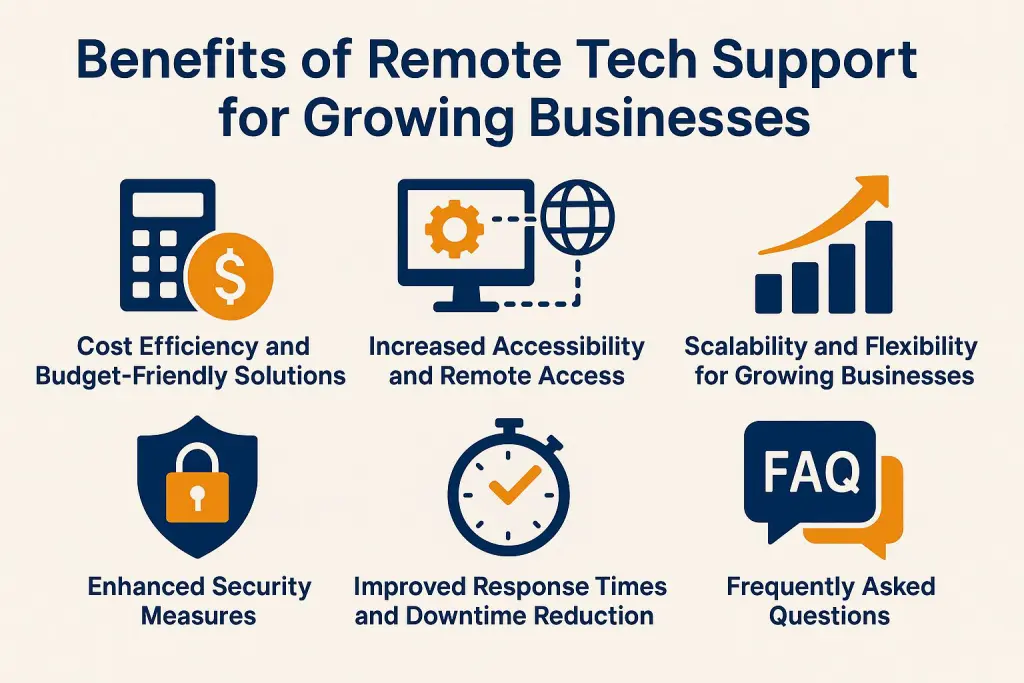Cloud Computing for Columbia Businesses: Key Benefits and Considerations

Cloud computing helps businesses in Columbia improve efficiency and innovate. It provides many advantages. This article looks at the main benefits of cloud computing. These include cost savings, flexibility, scalability, and better access for Columbia businesses.
However, moving to the cloud can be difficult.
The article provides best practices for a smooth cloud transition. This includes choosing the right cloud service provider and training employees.
The exploration will reveal how cloud computing can effectively transform business operations and promote business agility.
Definition and Explanation of Cloud Computing
Cloud computing means delivering services over the internet. This allows businesses to access resources like servers, storage, and software without needing local infrastructure. This paradigm shift in IT infrastructure allows businesses in Columbia to leverage advanced technologies including Software as a Service (SaaS), Infrastructure as a Service (IaaS), and Platform as a Service (PaaS), fostering innovation, supporting remote work, and facilitating digital transformation.
Cloud computing helps organizations work more efficiently. It also allows them to scale up as needed and improve performance. This flexibility supports rapid cloud migration, meets regulations, and improves data security and performance.
Companies that adopt cloud solutions streamline processes and reduce overhead costs. This enables better resource allocation and increases workforce productivity. As a result, companies can manage workloads and costs effectively. They are not limited by fixed expenses, which helps them grow. They can readily adapt to market changes and swiftly implement new strategies, enabling them to maintain a competitive edge and achieve greater agility in their operations.
Benefits of Cloud Computing for Columbia Businesses
Cloud computing provides numerous key benefits for businesses in Columbia, significantly transforming their operational landscapes through cost savings, enhanced flexibility, and exceptional scalability, fostering market competitiveness.
As organizations navigate the complexities of digital transformation, they can leverage cloud services to optimize resource management, promote collaboration tools, and ensure business continuity in an increasingly competitive environment. Worth exploring: Managed IT Services Columbia offers professional tech support that complements these efforts.
Cost Savings and Flexibility
One of the most significant advantages of cloud computing is the considerable cost savings it offers to businesses. By transitioning to cloud services, organizations in Columbia can effectively reduce their IT expenses related to infrastructure management and maintenance.
This model also provides exceptional flexibility, allowing businesses to adjust resources based on their specific needs while avoiding the limitations associated with vendor lock-in.
Through the adoption of pay-as-you-go pricing models, enterprises can achieve further savings by only paying for the computing resources they actually utilize, thus circumventing costly upfront hardware investments.
This adaptability not only facilitates the scaling of resources in response to fluctuating demand but also enables the seamless integration of various cloud service models, such as Infrastructure as a Service (IaaS) and Software as a Service (SaaS).
Consequently, companies can efficiently manage their workloads and expenses without being constrained by fixed costs or over-provisioned systems, ultimately positioning themselves for growth and enhanced operational efficiency.
Scalability and Accessibility
Scalability is a key feature of cloud computing. It allows Columbia businesses to easily adjust their IT resources for better performance without overprovisioning.
In conjunction with easy accessibility, cloud solutions enable teams to collaborate from any location, streamlining workflows and enhancing overall business agility.
This flexibility not only supports rapid growth but also enables companies to swiftly respond to changing market demands and consumer preferences. As businesses adopt scalable solutions, they can seamlessly integrate new technologies and tools that promote high levels of collaboration among remote working teams.
Cloud-based applications let employees access resources from many locations. This fosters innovation and teamwork through mobile access and cloud governance.
Organizations must change with conditions. They need to transition easily to more capacity or specialized tools. This reinforces their competitive advantage and keeps them relevant in a changing marketplace.
Considerations for Adopting Cloud Computing

When adopting cloud computing, businesses in Columbia must consider data security, integration challenges, and migration complexities like vendor lock-in.
A thorough understanding of these factors is essential for organizations to fully leverage the advantages of cloud technologies while ensuring compliance with regulatory requirements and effectively managing associated risks.
Security and Data Protection
Security and data protection are key concerns for businesses using cloud computing. Transitioning to digital services introduces new vulnerabilities. These must be managed with access control and encryption. By implementing robust cloud security measures and ensuring adherence to data privacy regulations, businesses in Columbia can protect sensitive information and uphold the trust of their stakeholders.
To strengthen security, prioritize strategies such as adopting encryption protocols. These protect data at rest and in transit.
Furthermore, understanding data sovereignty is essential, as it dictates where data is stored and how it can be accessed. A comprehensive disaster recovery plan is equally important, providing a structured framework to follow in the event of unexpected data loss or breaches, ensuring geographic redundancy.
Together, these strategies not only help prevent data breaches but also enhance the user experience by creating a secure environment in which stakeholders can engage with confidence.
Integration and Migration Challenges
Businesses in Columbia face integration and migration challenges when transitioning to cloud computing. These challenges affect system integration and cloud-native applications. Ensuring seamless interoperability between existing systems and new cloud services can be complex and requires meticulous planning, including risk management and change management. Addressing these challenges is essential for maximizing the potential of the cloud ecosystem and enhancing overall operational efficiency.
Among the specific difficulties faced are data transfer issues, which can result in inconsistencies and the loss of critical information, particularly when dealing with legacy systems that often lack compatibility with modern cloud solutions. Additionally, user accessibility can pose a significant concern if employees are not adequately trained or if the new systems lack intuitiveness.
To reduce these risks, organizations must develop a clear migration strategy. This should include data mapping and phased integration. Furthermore, technical support plays a vital role; having experienced professionals on hand can facilitate smoother transitions, resolve unexpected challenges, and ensure that all stakeholders are equipped to effectively leverage the benefits of cloud technology.
Best Practices for Implementing Cloud Computing
Implementing cloud computing requires following best practices. This ensures a smooth transition and maximizes technology benefits like performance monitoring and usage analytics.
Businesses in Columbia should focus on selecting the right cloud provider that meets their needs and offers strong technical support.
Additionally, it is essential to establish a clear cloud adoption framework to guide the transition effectively.
Choosing the Right Cloud Provider

Choosing the right cloud provider is crucial for businesses that adopt cloud computing. This decision influences operational success and technological adaptability. Companies in Colombia should evaluate providers based on SLAs, compliance, performance, and value.
In addition to these factors, uptime reliability is crucial. A provider’s ability to guarantee consistent availability helps businesses operate smoothly without disruptions.
Also, assess disaster recovery capabilities. A strong plan ensures quick recovery from data loss, minimizing downtime and costs.
Reliable customer support is vital. It offers assistance during critical times and builds a strong partnership.
To navigate the competitive landscape, businesses should analyze market trends, compare prices, and seek testimonials from clients. This comprehensive approach enables informed decisions that align with their specific needs.
Training and Support for Employees
Effective training and support for employees are essential when adopting cloud computing. This helps users leverage new technologies and boosts productivity. Columbia businesses should prioritize user training initiatives and service customization that emphasize skills development and provide ongoing support to cultivate a culture of continuous learning and software integration.
This approach is crucial in today’s fast-paced digital world. Staying ahead can set a business apart from competitors. Engaging users through interactive training sessions and hands-on workshops can simplify complex cloud tools, facilitating technology adoption, making them more accessible and manageable.
Establishing a structured onboarding process and resource library for IT infrastructure can be invaluable for new hires, ensuring that all employees are equipped to make significant contributions from the beginning. Additionally, having a responsive technical support team and clear service level agreements (SLAs) can alleviate the frustrations that often accompany technological transitions.
By using these strategies, organizations can improve the user experience. This leads to greater job satisfaction and better overall business performance and IT budget management.
Frequently Asked Questions
What is Cloud Computing and how can it benefit my Columbia business?
Cloud Computing delivers computing services over the internet. This includes storage, servers, databases, and software. It benefits your business by offering cost savings, scalability, flexibility, and improved collaboration.
What are the key benefits of using Cloud Computing for Columbia businesses?

The key benefits of using Cloud Computing for Columbia businesses include reduced IT costs, improved accessibility and mobility, increased data security, enhanced computing power, and the ability to easily scale up or down based on business needs.
What are some considerations to keep in mind when using Cloud Computing for my Columbia business?
Key considerations include ensuring data security, choosing the right provider, and understanding your business needs before implementing Cloud Computing.
Can my Columbia business save money by using Cloud Computing?
Yes, Cloud Computing can significantly reduce IT costs for businesses. With no need for physical servers and storage, businesses can save on hardware, maintenance, and energy costs, promoting environmental sustainability. It also offers a pay-as-you-go pricing model, allowing businesses to only pay for the specific services they need.
Is my data safe when using Cloud Computing for my Columbia business?
Cloud Computing providers have strong security measures. They protect data.
How can Cloud Computing improve collaboration and productivity for my Columbia business?
Choose a reputable provider. Implement proper data security measures and redundancy in your business. Regular backups and data encryption are important for security.
Cloud Computing allows employees to access files and work remotely. This makes collaboration easier. They can use customer relationship management (CRM) and business intelligence (BI) tools. It provides real-time updates and version control. This streamlines processes and boosts productivity.




